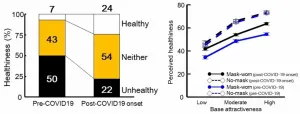Higher levels of omega-3 acids in the blood increases life expectancy by almost five years
A 1% increase in this substance in the blood is associated with a change in mortality risk similar to that of quitting smoking.
2021-07-22
(Press-News.org) Levels of omega-3 fatty acids in the blood are as good a predictor of mortality from any cause as smoking, according to a study involving the Hospital del Mar Medical Research Institute (IMIM), in collaboration with The Fatty Acid Research Institute in the United States and several universities in the United States and Canada. The study, published in The American Journal of Clinical Nutrition, used data from a long-term study group, the Framingham Offspring Cohort, which has been monitoring residents of this Massachusetts town, in the United States, since 1971.
Researchers have found that omega-3 levels in blood erythrocytes (the so-called red blood cells) are very good mortality risk predictors. The study concludes that "Having higher levels of these acids in the blood, as a result of regularly including oily fish in the diet, increases life expectancy by almost five years", as Dr. Aleix Sala-Vila, a postdoctoral researcher in the IMIM's Cardiovascular Risk and Nutrition Research Group and author of the study, points out. In contrast, "Being a regular smoker takes 4.7 years off your life expectancy, the same as you gain if you have high levels of omega-3 acids in your blood", he adds.
2,200 people monitored over eleven years
The study analysed data on blood fatty acid levels in 2,240 people over the age of 65, who were monitored for an average of eleven years. The aim was to validate which fatty acids function as good predictors of mortality, beyond the already known factors. The results indicate that four types of fatty acids, including omega-3, fulfil this role. It is interesting that two of them are saturated fatty acids, traditionally associated with cardiovascular risk, but which, in this case, indicate longer life expectancy. "This reaffirms what we have been seeing lately", says Dr Sala-Vila, "not all saturated fatty acids are necessarily bad." Indeed, their levels in the blood cannot be modified by diet, as happens with omega-3 fatty acids.
These results may contribute to the personalisation of dietary recommendations for food intake, based on the blood concentrations of the different types of fatty acids. "What we have found is not insignificant. It reinforces the idea that small changes in diet in the right direction can have a much more powerful effect than we think, and it is never too late or too early to make these changes", remarks Dr Sala-Vila.
The researchers will now try to analyse the same indicators in similar population groups, but of European origin, to find out if the results obtained can also be applied outside the United States. The American Heart Association recommends eating oily fish such as salmon, anchovies or sardines twice a week because of the health benefits of omega-3 acids.
INFORMATION:
Reference article
Michael I McBurney, Nathan L Tintle, Ramachandran S Vasan, Aleix Sala-Vila, William S Harris, Using an erythrocyte fatty acid fingerprint to predict risk of all-cause mortality: the Framingham Offspring Cohort, The American Journal of Clinical Nutrition, 2021;, nqab195, https://doi.org/10.1093/ajcn/nqab195
ELSE PRESS RELEASES FROM THIS DATE:
2021-07-22
Some antibiotics appear to be effective against a form of skin cancer known as melanoma. Researchers at KU Leuven, Belgium, examined the effect of these antibiotics on patient-derived tumours in mice. Their findings were published in the Journal of Experimental Medicine.
Researchers from KU Leuven may have found a new weapon in the fight against melanoma: antibiotics that target the 'power plants' of cancer cells. These antibiotics exploit a vulnerability that arises in tumour cells when they try to survive cancer therapy.
"As the cancer evolves, some melanoma cells may escape the treatment and stop proliferating to 'hide' from ...
2021-07-22
An international collaborative study led by University of Helsinki has conducted a holistic study to investigate the effects of COVID-19 restrictions on several air quality pollutants for the Po Valley region in northern Italy. The area is well known to have one of the worst air quality standards in Europe and is highly influenced by anthropogenic (human-led) activities. The study was done between research groups in Finland, Italy and Switzerland and the results were published in the journal Environmental Science: Atmospheres.
Scientists have combined air quality measurements and computer simulation data over several locations in the region. The resulting studies show that reduced emissions from traffic lead to a strong reduction of nitrogen ...
2021-07-22
Targeted removals can be effective in suppressing the number of invasive lionfish found within protected coastlines around the Mediterranean Sea.
However, if they are to really be successful they need to be combined with better long-term monitoring by communities and conservationists to ensure their timing and location achieve the best results.
Those are the key findings of a new study, one of the first of its kind to examine the effectiveness of targeted lionfish removals from both an ecological and a socio-economic perspective.
Scientists working as part of the European Union-funded RELIONMED project ...
2021-07-22
The Covid-19 pandemic has improved perceptions of facial attractiveness and healthiness of people wearing face masks in Japan.
Wearing sanitary facemasks was not uncommon in Japan prior to the Covid-19 pandemic. Public health initiatives during the pandemic have led to a drastic increase in the use of facemasks as they reduce the transmission of the SARS-CoV-2 virus. The sanitary-mask effect is a model that predicted how facemasks affected perceptions of facial attractiveness. However, as mindsets might have changed due to the pandemic, it is likely that the sanitary-mask effect has been altered.
A team of four scientists, including Professor Jun I. Kawahara from Hokkaido University's ...
2021-07-22
Pregnant women in South East Asia are more likely to use smokeless tobacco than non-pregnant women, despite the added risk of foetal harm during pregnancy.
The study - from the University of York - also suggests that there is no difference in smoking between pregnant women and non-pregnant women in many lower to middle income countries.(LMICs)
Researchers analysed data from 42 lower to middle income countries (LMICs) and also conducted a separate sub-group analysis for the South East Asia Region. (SEAR)
Researchers said the study is the first to report comparative estimates of tobacco use among pregnant and non-pregnant women from the 42 LMICs encompassing 80,454 pregnant and 1,230,262 non-pregnant women.
Dr Radha ...
2021-07-22
Results from a new survey of astronomers and geophysicists show that these sciences have a systemic bullying problem; one that is disproportionately worse for women and those from minority groups. In a survey carried out by the Royal Astronomical Society (RAS) last year of over 650 people in the field, 44% of respondents had suffered bullying and harassment in the workplace within the preceding 12 months. Aine O'Brien, RAS Diversity Officer, will present the key results in a talk at the virtual National Astronomy Meeting on Thursday 22 July.
Key initial findings show:
Disabled, and Black and minority ethnic astronomers and geophysicists are 40% more likely to be bullied than their non-disabled and White colleagues respectively.
Women and non-binary people in the field are 50% more ...
2021-07-22
Remote 24-hour monitoring for cancer patients receiving chemotherapy helps to better manage side effects and improve quality of life, finds a study published by The BMJ today.
The researchers say remote monitoring can provide a safe, secure, and "real time" system that optimises symptom management and supports patients to remain at home - and is particularly relevant in the context of the covid-19 pandemic.
Effective symptom monitoring and management is essential during chemotherapy for cancer, but current approaches rely on patients recognising that symptoms are severe ...
2021-07-22
Two years on from its pledge to make England smoke free by 2030, the UK government has failed to deliver on the policies it promised to deliver this ambition, say a group of leading doctors, professional bodies and charities in The BMJ today.
In an open letter to the Prime Minister and Secretary of State for health, they say smoking is likely to have killed more people last year than covid-19 and it will carry on doing so for many years to come unless the government takes action.
They call for a US-style 'polluter pays' levy on tobacco manufacturers to fund the strategy, saying "the time has come to make the tobacco manufacturers pay to end the epidemic they and they alone have caused."
The rate of decline in smoking in the years leading up to 2019 was not sufficient to deliver ...
2021-07-22
A new approach to analysing the development of magnetic tangles on the Sun has led to a breakthrough in a longstanding debate about how solar energy is injected into the solar atmosphere before being released into space, causing space weather events. The first direct evidence that field lines become knotted before they emerge at the visible surface of the Sun has implications for our ability to predict the behaviour of active regions and the nature of the solar interior. Dr Christopher Prior of the Department of Mathematical Sciences, Durham University, will present the work today at the ...
2021-07-22
A new study by investigators from Brigham and Women's Hospital examined the relationship between active lifestyles and the risk of obstructive sleep apnea (OSA). The study followed around 130,000 men and women in the United States over a follow-up period of 10-to-18 years and found that higher levels of physical activity and lower levels of sedentary behavior were associated with a lower risk of OSA. Their results are published in the European Respiratory Journal.
"In our study, higher levels of physical activity and fewer hours of TV watching, and sitting either at work or away from home ...
LAST 30 PRESS RELEASES:
[Press-News.org] Higher levels of omega-3 acids in the blood increases life expectancy by almost five years
A 1% increase in this substance in the blood is associated with a change in mortality risk similar to that of quitting smoking.


